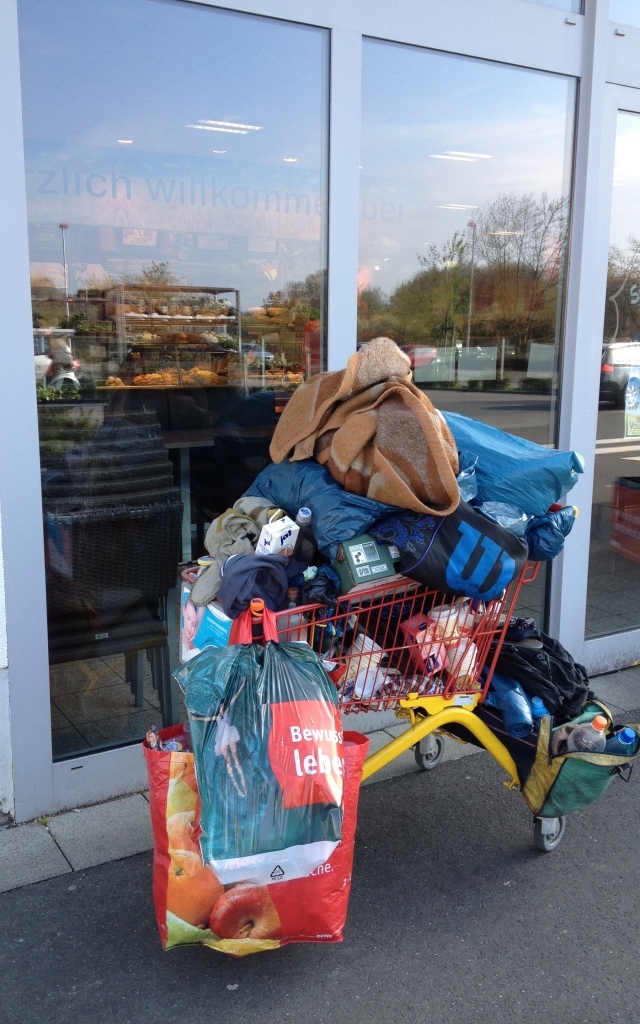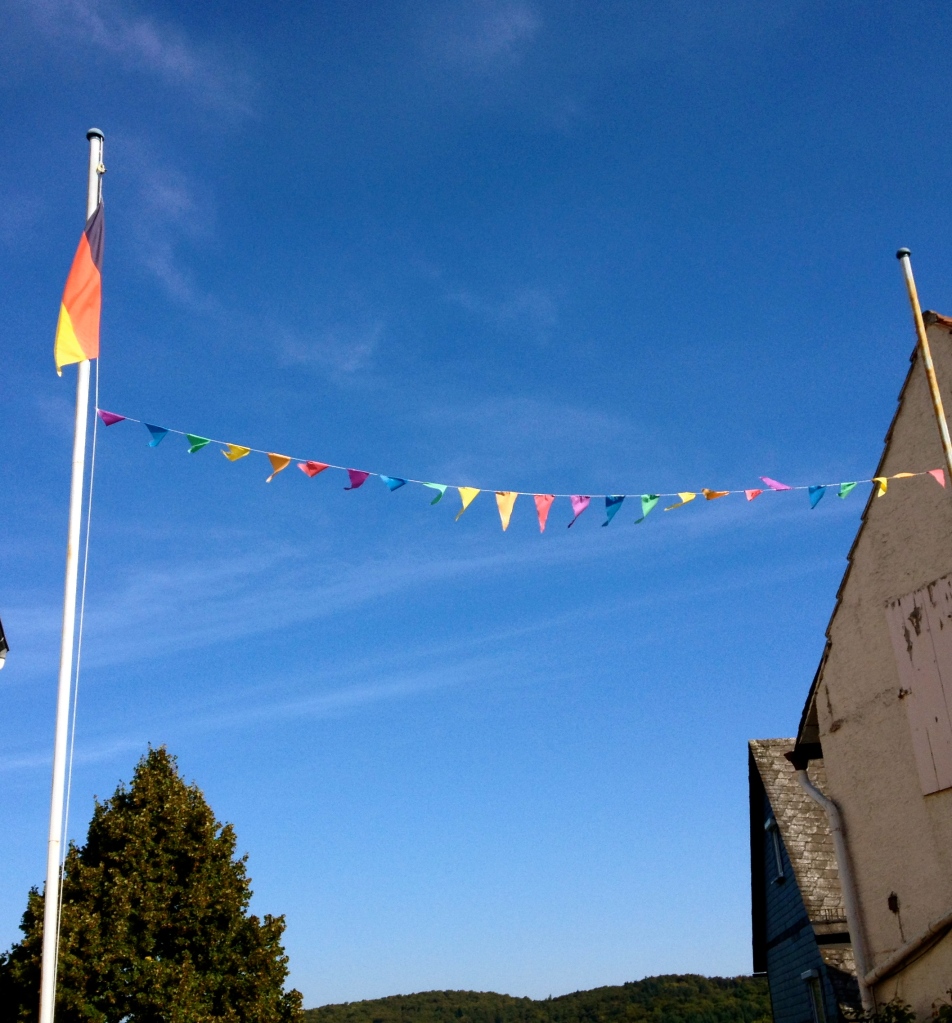 Manni needs a tooth. The last few times I have seen him, he has asked me how much a tooth cost. He asked me to look and see if he still has teeth and asked me whether I myself have teeth. Manni, short for Manfred, is our village bum. I have known him since I was a teenager, which is some 20 years ago. Back in the 1990s, he would ring our doorbell and ask for money. A tall man, probably 2 meters in height, he always wore a long grey trench coat and pants that nearly fell off his waist. With his shopping cart Manfred wandered down the main street, knocking and ringing on all doors. Initially I was scared of him, but after a while my family and I realized he was harmless. Manni always begged friendly, smiled and left when nothing was to be had. Over time, he learned our names and professions and held conversations with us as we passed him on the street.
Manni needs a tooth. The last few times I have seen him, he has asked me how much a tooth cost. He asked me to look and see if he still has teeth and asked me whether I myself have teeth. Manni, short for Manfred, is our village bum. I have known him since I was a teenager, which is some 20 years ago. Back in the 1990s, he would ring our doorbell and ask for money. A tall man, probably 2 meters in height, he always wore a long grey trench coat and pants that nearly fell off his waist. With his shopping cart Manfred wandered down the main street, knocking and ringing on all doors. Initially I was scared of him, but after a while my family and I realized he was harmless. Manni always begged friendly, smiled and left when nothing was to be had. Over time, he learned our names and professions and held conversations with us as we passed him on the street.
Throughout the past year in Germany, I have seen Manni frequently. Nowadays, he walks bend, with a blanket wrapped around his lower body like a skirt. His face is tanned and weathered, sticky hair, hanging to his shoulders, but what most intrigues me are his large blue eyes. He still pushes a shopping cart that is filled with bags, paper cups, packs of cigarette, clothes, bottles, plastic scarp, boxes of food and the Bible (out of which he tore a page the other day, so he could write me a shopping list).
Although he knows my name, he likes to call me differently each time I see him. These days I am Kerstin. Before that I was Monica, and in between I am Miriam again or Mrs. Moeller. Usually, Manni asks me to get him some food from the store. The other day I ran into him at the cemetery where he slept under the patio roof of the chapel. It was dark already, and he asked me to get him cigarettes and some groceries: grapes, chips, and trash bags. I left him my loose tobacco (which he returned the next day because he did not know how to roll cigarettes) and told him I would return with his errands the next morning. The next day I came back with the goods, but overnight, Manni decided he also needed the following: 2 packs of cigarettes, bread, milk, oh and a yogurt would be nice, and don’t forget the applesauce, he said. “And, Kerstin, dark chocolate? Two bars? Yes? That would be nice. And sausages? Six sausages in the glass … and a black coffee? That’s very nice.” Then, to my surprise, he pulled out a 50 Euro bill and handed it to me. He kept his money in an empty pack of cigarettes where I saw several other pretty dirty bills (20s, 10s, 50s). Then, also to my surprise, he wrote down the serial number of the bill he had given me. This made me wonder.
When I returned with the groceries and his change, Manni asked me to call his friend whom he knows from childhood. We couldn’t reach his friend, so I tried later again when I was back home. His friend said he would go visit Manni, sighing and sounding like he frequently gets calls from strangers about his friend Manni.
Manni is an interesting character. He always has a funny thing to say. Today when I bought him a newspaper, baby powder and artificial sweetener, he said: “Du bist ja ne Nummer,” which means so much as: “You are quite impressive,” or literally “You are quite a number.” Once when my brother Fredi and I saw him in the woods on a very hot day (Manni was wearing two jackets and dripping sweat, asking for water and food), Manni told us: “Ich geh jetzt mal in Deckung,” or something like “I will seek shelter now.” It sounded like something a soldier would say.
My family has often wondered what Manni’s story is: My great-aunt told me that he is an educated man who held a job once. She told me that he used to live in an apartment nearby. Other people have told me that he chose to live on the streets, that he used to have a lot of money and that his friends betrayed him for it.
The other day I decided to ask him directly about his life: He said he is 50 years old (“und ein paar zerquetschte”) and that he comes from the nearby village of Rechtenbach. He spends the winters in a “Wohnheim” or what I take to be a homeless shelter. Before he lived on the streets he was “working” in a school. I asked if he was an instructor, and he said: “something like that.” I could tell that he didn’t want to talk about his past.
I have thought a lot about Manni, and sometimes I wonder whether he really chose this lifestyle, especially because he seems to have money on him at all times, and he always offers to pay me back. I asked Manni why he doesn’t go into the stores himself to buy stuff, but he didn’t give me a straight answer. I am pretty sure that he is not allowed in the stores as he does look quite ragged and sometimes he smells a little or his pants hang way too low …
In some odd way, I admire Manni’s life: he has no obligations, and he experiences kindness of people, probably every day. When I shopped for him today, a woman next to me in line asked: “What are you buying for Manni?” Then she added: “I am getting him coffee and a sandwich.” While I was talking with Manni, a young man handed him a chocolate bar. Not too bad of a bum life?
But I do wonder whether Manni is lonely. When I talk with him, he comes quite close, and sometimes he smells my hair or pokes my shoulder with his finger. I can sense that he graves touch, and I have begun patting his shoulder when I bid him goodbye. I am not sure why I have such an interest in Manni. Perhaps it is because his eyes are clear and true and a bit impish, and he is appears to be kind? Perhaps because I always feel more comfortable with people who don’t participate in society, in what is considered a “normal” life? Although I still don’t know if he chose this lifestyle.
Maybe it’s because my family and I have known him for such a long time, and he feels familiar to us? For instance, on Monday, he stood on the street in front of my house where we were celebrating my brother’s birthday. After we gave him some cake, fruit and a pot of coffee, Manni congratulated Fredi, and then recognized everyone in my family.
In Marquette, I worked in a homeless shelter and I wrote a series about rural homeless people for the newspaper*. Today after seeing Manni again, I dug up my articles and decided to volunteer again in the shelter in my hometown. There is nothing more satisfying to me than helping others and putting a smile on their faces. Perhaps simply that is my calling in this life.
*Here are links to some of the articles I wrote about homeless in Marquette:
http://www.miningjournal.net/page/content.detail/id/520099.html
http://www.miningjournal.net/page/content.detail/id/520046.html?nav=5087
http://www.miningjournal.net/page/content.detail/id/520153.html
http://www.miningjournal.net/page/content.detail/id/520104.html









